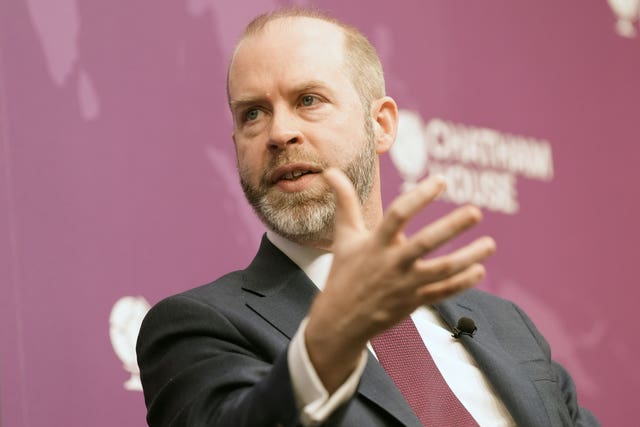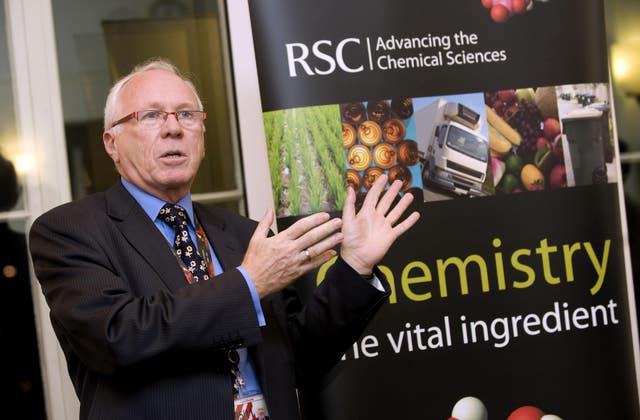Government urged not to ‘sacrifice’ British agriculture in US trade talks
Farming and food sector leaders said they were ‘very concerned’ about the concessions ministers could make to secure exemptions from US tariffs.

The Government has been warned not to “sacrifice” British agriculture to seal a US trade deal amid growing concerns over biosecurity.
Farming and food sector leaders said they were “very concerned” about the concessions ministers could make while trying to secure an exemption from Donald Trump’s tariffs.
Lord Rooker, former Food Standards Agency chairman; Tom Bradshaw, president of the National Farmers’ Union; and Rob Mutimer, National Pig Association chair, were among the sector leaders who spoke about biosecurity at a briefing on Tuesday.
The group called for the Government to step up disease prevention measures as Europe grapples with the threat of African swine fever and foot and mouth disease.

It came after Business Secretary Jonathan Reynolds told Times Radio that food standards were a “red line” in trade talks for the UK, suggesting the country would not accept US hormone-treated beef and chlorine-washed chicken – a major sticking point in previous negotiations.
However, the Government could compromise in other areas, like eliminating tariffs of up to 12% on US beef, chicken, and pork, the Times reported.
This would give US producers – who have lower standards and a competitive advantage – greater access to the UK market, putting struggling British farmers under further pressure.
Mr Bradshaw said: “I think we’re very very concerned.”
Mr Bradshaw said the sector has an “absolute expectation that (ministers) cannot sacrifice agriculture at this moment in time to the benefit of other sectors”.
He added: “Taking our food security for granted in an increasingly volatile world, an increasingly insecure world, is something which is a risk too far for 70 million consumers living on this island and the Government has got to stand up for agriculture at this moment in these trade deals.”
Of the lower standards of production seen in the US, Mr Bradshaw argued: “If we don’t want them in this country, we shouldn’t import food produced to those standards, because it should be a barrier.
“It should be a red line which cannot be crossed. And so this is a moment of reckoning here for what (it is that) the UK stands for in global trade.”
As a major exporter to the US, he acknowledged the UK’s dairy sector’s exposure to tariff.
But he added: “That really doesn’t mean that we can afford to do a deal at all costs.”

Lord Rooker, former chairman of the Food Standards Agency and a former environment minister, also said he is “concerned” about the trade talks.
He added: “I don’t think we should go anywhere near – in terms of trade deals with America – imports of so-called fresh foods.”
He said the US has to douse chickens in chlorine and anti-microbial washes because of the “appalling way” it produces them, before citing official figures that show one in 25 packs sold at American supermarkets are contaminated with salmonella.
“This idea that we can import from America safely is simply not true,” he added.
Elsewhere, the group said the lack of funding, basic biosecurity measures and resources for research centres is putting the UK at risk of disease outbreaks.
Mr Bradshaw said taking the issue for granted is “absolute folly”, adding: “I think that it’s very easy to forget about the level of investment that is required, but we have significant threats at our borders already.”
It comes amid fears over the rise of foot and mouth disease and African swine fever in Europe, as well as illegal imports of meat from Romania, which are coming through ports like Dover and Holyhead without being thoroughly checked.
An outbreak of either disease would require complete eradication and the country would risk losing its ability to export produce abroad for years.
The estimated cost of the 2001 outbreak of foot and mouth for the UK public and private sector was around £8 billion, equivalent to £14.7 billion today, according to the National Audit Office.
“The cost of that is simply unthinkable with the finances of the country as they are today,” Mr Bradshaw said.
As a long-time pig farmer, Mr Mutimer also said the animal welfare and mental health impact of mass slaughter would be “massive”.
“That’s worth having some insurance for that,” he said.
The group declined to put a figure on the amount of Government investment needed to boost biosecurity, recognising “the scale of the challenge” on the Environment Department’s (Defra) budget.
Mr Bradshaw said: “What we are doing is saying to wider Government and Defra, you can’t overlook this.”
The Department for Business and Trade referred to Mr Reynolds’ interview on Times Radio, in which he also said he wanted goods to be “as cheap as possible for UK consumers”.
“The regime that we put in place in the UK, what we call our SPS regime, which is our food standards regime, that’s the red line for us,” he said.
“That’s a really important area that we wouldn’t be able to negotiate on. And the US understands that position, as do other countries.
“So of course, the set of things you talk about and some things that you can’t, I absolutely believe agreement is possible with the US.”





